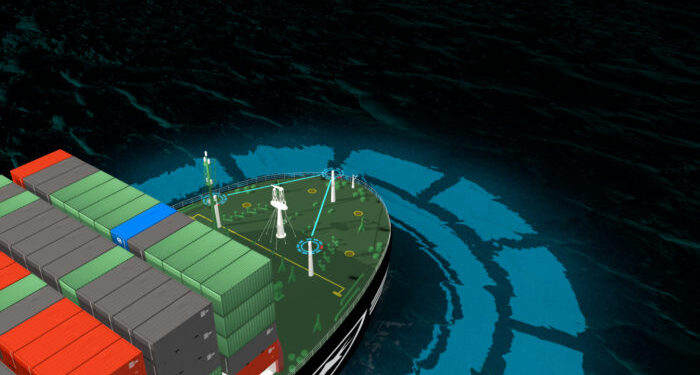The ongoing development of Maritime Autonomous Surface Ships (MASS) could significantly impact many of the critical challenges faced by the sector today. For instance, MASS can help the industry address the growing international challenge of crew shortages, as well as the management of seafarers’ welfare and workload, LR notes in a recent report.
In particular, in the report titled ”Maritime Autonomous Surface Ships (MASS): Creating a Framework for Efficiency, Safety, and Compliance”, the classification society emphasizes the imperative need for the industry to develop regulatory and assurance frameworks essential for ensuring the operational safety of MASS.
”The current standards established by the STCW, COLREGs and SOLAS conventions have provided a solid foundation for maritime safety and operation. However, the introduction of MASS necessitates a thorough review and augmentation of these frameworks to accommodate the unique challenges and requirements posed by autonomy.”, the report mentions.
In this context, LR proposes that a multi-stakeholder collaboration is formed, between governments, as funding partners, Regulators and their recognised organisations in maritime, and key industry stakeholders, including ship operators, ports and other identified participants in the sector.
The main purpose of this collaborative effort would be to define the steps necessary to adequately adapt COLREGs, STCW and SOLAS to facilitate the safe operation of MASS, in line with the ongoing advancements in autonomous systems technologies.
In the report, LR examines the challenges of integrating MASS into the existing regulatory framework.
COLREGs
COLREGs are a vital tool in reducing the risk of accidents for mariners worldwide, promoting clear communication and harmonised practices. In reality however, application of the regulations requires specific issues to be interpreted on a case-by-case basis to determine how multiple rules are concurrently considered, prioritised and/or applied.
For example:
COLREGs Rule 5 states: “Every vessel shall at all times maintain a proper look-out by sight and hearing … in the prevailing circumstances and conditions so as to make a full appraisal of the situation and of the risk of collision.” This terminology is clearly human-centric but may be interpreted as the situational awareness of whomever controls the ship and their ability to take informed decisions to avoid collisions and other incidents. However, clarity on how to accomplish this role is required. Moreover, the responsibility for maintaining a lookout is less clear when there are no human operators on board to oversee the vessel’s navigation.
COLREGs Rule 8 outlines the actions to be taken to avoid collisions, including alterations of course and speed. However, the term “to avoid collision” lacks a precise definition, leaving room for subjective interpretation. While this rule provides general guidance, its application of the term “early and substantial action” also lacks quantifiable parameters and raises questions about how MASS vessels should prioritise collision avoidance manoeuvres and interact with other vessels. Factors such as vessel size, speed, and manoeuvrability can influence what actions constitute adequate collision avoidance, introducing ambiguity into maritime operations.
Consideration should also be given to defining the term ‘good seamanship’, as well as ‘timely’, ‘too close’, ‘safe distance’, ‘vessel is clear’, and ‘sufficient distance’. These are often referred to in case law and have therefore arguably been assigned meaning, but they have not been codified. While ‘good seamanship’ has been described as “appropriate practice for the operation of ships”, there is no specific definition. These ambiguities could pose challenges during complex and dynamic situations.
STCW and the role of the crew
The STCW Convention and Code lay down minimum standards for the training and certification of seafarers globally. While the Convention addresses general principles, the detailed requirements are outlined in the Code. However, there are no quantitative standards, and certification of qualifications is left to IMO Member States, who then delegate that responsibility to educational and training institutions.
For MASS, we need to define how – and potentially where – these navigational roles will be augmented
or transferred, identifying which competencies can be replaced by MASS technologies and which cannot.
…LR points out.
Furthermore, the combination of the human and these new technologies is likely to change the nature of certain onboard roles and may therefore affect the competencies required of the human as the role evolves.
The STCW consists of 66 Knowledge, Understanding & Proficiency (KUPs) items across 19 competence themes outlining the minimum standard of competence for officers and ratings across all shipboard areas (Nav, ER, Radio, Cargo). By establishing these standards, the STCW defines the skills and competencies required to fulfil designated roles effectively. Autonomy will redefine how – and where – many of these roles are delivered. Some will be augmented or superseded by autonomy, while others may be transferred to Remote Operating Centres.
It will be important to maintain a humancentred approach and focus on the emergent issues of seafarers’ training and competency standards as MASS development continues.
Adapting SOLAS for MASS
Various provisions within SOLAS could create challenges in interpretation in a MASS environment.
Examples include:
• SOLAS Ch. II-2, Reg. 7 Detection and Alarm – This regulation calls for fire patrols, including regular patrols by the crew to detect and extinguish fires as early as possible, without relying on fire detectors.
• SOLAS Ch. III, Life Saving Appliances and Arrangements – In this section, Reg. 20 on Operational readiness, maintenance, and inspection specifies the recording of various life-saving equipment in the Inspection and Logbook. Changing manning levels in an autonomous environment may change the requirements for lifesaving equipment, though lifeboats may also serve as rescue boats, and may be needed to deal with marine casualties.
• SOLAS Ch. IV, Radiocommunications – Reg. 12 (Watches) requires ships to maintain a constant radio watch on a range of frequencies. In addition to DCS messages, support for voice communications is also required. Reg. 16 (Radio Personnel) also states that every ship must carry personnel qualified for radio communications and that a crew member must be designated as responsible for distress communications.
• SOLAS Ch. V, Safe Navigation – Reg. 5 (Meteorological services and warnings) require meteorological observations to be recorded and communicated to land stations and surrounding vessels in the event of severe weather. In addition, Reg. 24 (Use of heading and/or track control systems) requires that the possibility to switch to manual steering be maintained where heading and/or track control systems are in use, and that manual steering should be tested under the supervision of a responsible officer after prolonged use of HCS/TCS.






























































